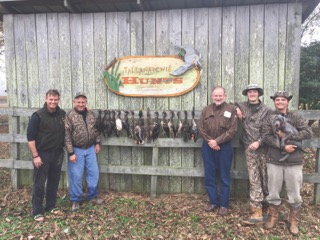By Susan Montgomery
There’s something about the sights and sounds—and even the scents – of the duck country that draws hunters from almost everywhere to Mike “Catfish” Flautt’s custom hunting setup,Tallahatchie Hunts, near Webb.”
“Somebody asked one of my pals how we get there,” says 16-year patron Mac McClinton, an automobile dealer from Parkersburg,, West Virginia. The buddy replied that they drive to Memphis, head south another 100 miles and then “go back 200 years.”
Flautt would understand. He explains the allure by describing his part of the world as a an area without a stop light for 30 miles —a place where dawn’s signal to ducks in flooded fields and woods sets them in flight like a scene from a movie.
Flautt, 64, a farmer, has been going to that picture show most of his life. He lives smack in the middle of the county, in what he describes as a bowl formed by the convergence of rivers; so it’s always wet come the end of harvest season and through the winter months. The land’s full of deer, and it’s along waterfowl’s Mississippi flyway.
Hunts there were private until 2000, when he and his wife, Hedy, decided to invite paying guests.
“We had a bad cotton crop and no money for the winter, and we always had people come in for the weekend to to hunt here,” he explains.
They already had places where hunters could stay, so they went to work. She handled the cooking and housing, and he, the hunts. “That burned along for about five years, and we got so we depended on it for wintertime income,” he says. Then she passed away.
And Flautt expanded the scope of the operation.
“Basically, I quit hunting. I hired all of these boys (guides) to work for me,” he says. He gathered a crew of family members and devoted to staff to provide for comfortable accommodations and tasty, ample meals.
“Business just took off,” he says.
“I would say that in a normal year, we have hunters from 35 states and five or six foreign countries, easily.” he says. Hunters have come from Australia, Turkey, England, France, Germany, South Africa, Trinidad, and Italy, for example. “And there are the Canadians,” he adds.
The numbers increased from 300 hunts a year to 450, and then 700. But 2008’s financial crisis knocked them way back. Something had to be done.
The Flautts had advertised in print when they started the business, and they had promoted it. They attracted customers through word of mouth, but they needed outreach past Mississippi. That’s when Flautt turned to his son, Bolton, who now lives and works near Phoenix, for ideas about Internet advertising.
“Dad had a lot of corporate clients, and they all went away when the real estate bubble collapsed,” Bolton Flautt says. “He asked me if I knew anything about advertising on Google. I didn’t but I thought I could figure it out.” He tried Adwords.
He carefully chose keywords he thought potentional duck hunters would use when searching on the Internet to find a place to hunt. “Right away, the phone started ringing. We went from 150, duck hunts in December, I think, to 550 in January.”
His dad said many of the callers were women looking for Christmas presents for their husbands, which is one reason that January was so busy.
The Flautts also traveled to promote Tallahatchie Hunts. “We started going to expos and hunting shows. We probably did five or six a year,” Bolton says. They were featureed on outdoors TV shows and in magazines such as the Ducks Unlimited magazine to Garden & Gun.
Mike Flautt is particularly pleased that the Ole Miss alumni magazine ran a feature. He’ holds degrees from Millsaps College and Vanderbilt University, but not the University of Mississippi. Someone explained to him years ago that he could be a “walk-on alum” with Ole Miss, so he started paying alumni dues. The connection means a good deal to him—he’s all about Ole Miss sports—and to Tallahatchie Hunts.
Many of the 25 “college boy” guides come from Ole Miss, and their associations benefit the business. McClinton, the longtime patron from West Virginia, learned about Tallahatchie Hunts because he had a son at Ole Miss, who was friends with the Flautts’ nephew, a guide.
“I have been hunting with Mike in 2002,” he says. “I started going there before he had the operation he does now. He has built his guiding business up considerably in the last 15 years.”
Flautt said he in fact has reduced the number of hunts he offers 1,500 to 1,000 and raised the price to $500 a hunt. This includes a one-night stay plus meals. Each hunt comes with a guide and a retriever. There are 78 places to hunt on about 10,000 acres, including the 8,000 on which Flautt farms soybeans, wheat and milo.
Bill Ragan, a nurse anesthetist in Jackson, Tenn., hunts with the Flautts and in Arkansas and Missouri. “I chase the ducks everywhere,” he explains.
He said he expects he’ll be at Tallahatchie Hunts in January, and he usually comes five or six times a year. He likes not having to haul a dog and a four-wheeler. “At 65, it’s nice not to worry about having to bring all of that stuff. It’s really simple. He makes it nice. I have carried my grandsons down there. It’s really been a good thing for us.”
McClinton says, “I love the people down there. It is comfortable, and I am treated like family and just am comfortable being around the Flautt family.”
It sometimes happens there are days when the ducks aren’t circling overhead. But that’s not McClinton’s only objective. “We have a lot of success, but like in any other kind of hunting, you don’t always go for the kill. My crowd likes being with nice people and enjoying the experience.”

